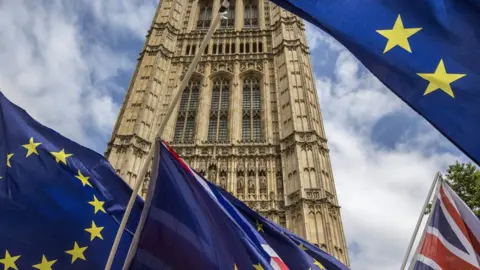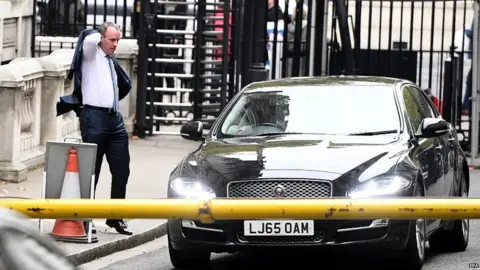Brexit: Cabinet aims for deal by end of November
 EPA
EPASenior ministers have agreed they want to reach a Brexit deal with the EU by the end of November, sources say.
"Everyone saw the difficulties of leaving it longer," a senior cabinet source told the BBC.
Meanwhile, the BBC has seen a detailed suggested timetable of how the government could try to sell a deal to MPs and the public.
It includes speeches from Theresa May and support from business figures and foreign leaders.
The notes, which the government has dismissed, suggest the cabinet had hoped to review a Brexit withdrawal deal when it met earlier.
Sources say a final deal was not presented to the cabinet but that ministers agreed they want a deal to be done this month and they could meet again later this week.
Deal presentation plans?
The UK is due to leave the EU on 29 March but the two sides have not yet agreed on the terms of its departure, with the Irish border proving the main sticking point.
If a deal can be reached with the EU in time, Mrs May will then need to persuade her party - and the rest of Parliament - to support it in a key Commons vote.
The notes seen by the BBC outline how ministers could present the deal, saying: "The narrative is going to be measured success, that this is good for everyone but won't be all champagne corks popping."
They refer to a speech by Mrs May to the CBI, saying: "We have delivered on the referendum."
And they go on to talk about the government "lining up 25 top business voices...and lots of world leaders eg Japanese PM to tweet support for the deal".
It suggests the government would hope to declare they had made decisive progress and to get the deal through Parliament in less than three weeks.
But a government spokesman said: "The misspelling and childish language in this document should be enough to make clear it doesn't represent the government's thinking.
"You would expect the government to have plans for all situations - to be clear, this isn't one of them."
The spokesman did not deny there were advanced plans for building support for a deal if and when it is concluded.
Labour MP Hilary Benn, who chairs the Commons Brexit select committee, said Mrs May should concentrate on securing a deal rather than on how to sell an agreement that was not yet done.
"When you get a deal, you can think about how you are going to tell people about it," he told the BBC.
Cabinet 'backstop' discussions
Earlier, No 10 said the prime minister assured ministers that the cabinet would meet before the UK agreed to any deal on the terms of the UK's exit.
The withdrawal deal is said to be 95% complete but the tricky bit is proving to be how to honour the commitment by both sides to guarantee no new hard border in Ireland.
There is disagreement on whether this "backstop" should apply to Northern Ireland, or the whole of the UK - and on whether it should be time-limited or revoked by the UK.
 EPA
EPAAt the cabinet meeting it is understood ministers discussed the mechanism for governing the backstop and who should decide when it no longer applied.
Attorney General Geoffrey Cox is understood to have set out the legal position for an independent review mechanism for the backstop.
He is believed to have told ministers there is a legal "spectrum" of what is possible to prevent the UK from being trapped "in limbo".
The Irish border is an issue because after Brexit it will become the UK's land border with the rest of the EU, which has a single market and customs union so products do not need to be checked when they pass between member states.
EU negotiator Michel Barnier told a Belgian broadcaster that the Irish border remained the main hurdle to be overcome but if enough progress is made he would recommend that a summit is convened to finalise the deal.
Lorry permits
Meanwhile, the government has published the criteria for allocating scarce permits for British truckers who need to drive in the EU after Brexit.
The permits will be shared out based on: vehicle emissions, number of international journeys in the previous year, number of international journeys as a percentage of all journeys, type of goods transported and an element of chance.
The Department for Transport document says the permits would be required for a no deal scenario BUT might also be required after the future economic partnership is agreed, depending on the type of deal.
